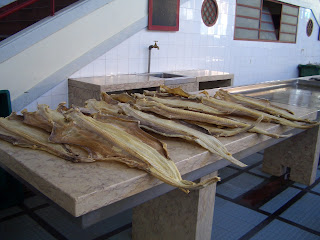
On 28th January I wrote of our
Irrational Behaviors, following the theme of the essay by Ervin Laszlo on “The World’s Health Problem: an Integral Diagnosis” in
A New Renaissance – Transforming Science, Spirit and Society. Our Irrational Behavior Number One is that "Millions are suffering from overeating and obesity and a thousand million go hungry."Where, I asked, was our compassion for our fellow humankind? Where is our empathy?
Now I want to move on to Laszlo's
Irrational Behavior number 2."The wellbeing and possibly the very survival of humanity are in question, but most of us remain occupied or preoccupied with making money and holding on to our privileges."I love this Greenpeace banner:
When the last tree is cut, the last river poisoned, and the last fish dead, we will discover that we can't eat money...
And here is a thought from Satish Kumar from his classic article “Spiritual Imperative,” in Resurgence 2005.
 "This notion of spiritless existence can be described as materialism. All is matter; land, forests, food, water, labour, literature and art are commodities to be bought and sold in the marketplace - the world market, the stockmarket, the so-called free market… Business without spirit, trade without compassion, industry without ecology, finance without fairness, economics without equity can only bring the breakdown of society and destruction of the natural world. Only when spirit and business work together can humanity find coherent purpose."
"This notion of spiritless existence can be described as materialism. All is matter; land, forests, food, water, labour, literature and art are commodities to be bought and sold in the marketplace - the world market, the stockmarket, the so-called free market… Business without spirit, trade without compassion, industry without ecology, finance without fairness, economics without equity can only bring the breakdown of society and destruction of the natural world. Only when spirit and business work together can humanity find coherent purpose."
And here is one of my least favorite quotes:
‘What...[is wealth]…to you?’ the headline asked. ‘It’s being able to tell the world to get lost.’ This was from a series of bank advertisements run some while ago on the management of wealth, and it appeared in the popular glossy weekend media. To accompany this particular advert. there was a picture of a lone and pretty girl cantering away on a lovely white stallion into the beautiful and totally unblemished distance.
How can any single one of us afford to turn our back on the world in this way in any sense. How can any of us ride away to an unblemished horizon while so many basic human rights are not available to so many? That surely diminishes us as human beings. But someone, indeed a team of people, wrote that advertisement.
Where is our compassion? Where is our empathy?But I see a glimmer of hope in what is coming out of Davos, the little mountain village in Switzerland where once a year corporate CEOs, heads of state, and leaders of nonprofit organizations from around the globe gather to reflect upon the state of the world at the “World Economic Forum." Reporting from Davos, Jim Wallis in an article at the Sojourners site
Values from Davos, tells us that whilst in previous years he has struggled to bring the subject of moral values within the economy into the mainstream of discussions, now we are in economic crisis, the values conversations suddenly seem far more relevant. In 2009, he tells us,“there were 17 sessions with the word “values” in the title.” Now new buzz topics are “human flourishing” and “the common good.” And business executives have been telling him that they feel alone in their soul-searching for values, and business ethics professors at some of the country’s leading business schools tell him that their courses are over-subscribed, yet they still feel marginal to the curriculum.
But behaviors created this crisis, and unless values talk leads to changed behaviors, it won’t mean very much, he says. This is so much music to my ears - my own thesis really.
Wallis now finds himself the chair of a new Global Agenda Council on Values, its task to shape what the World Economic Forum is calling the “Moral Economy Dialogue.” This is intended to develop serious tools for personal, organizational, corporate, and national values assessments that focus on changing behaviors.
I quote Wallis: "This is all good news to Klaus Schwab, the founder and executive chairman of Davos who, as a young Swiss economist many years ago, wrote about the need for business to not only take into account the interests of shareholders, but also of the many other stakeholders — including employees, consumers, the poor, the environment, and future generations…That Davos would take these issues very seriously…is good news…But the headline in yesterday’s International Herald Tribune — “The Super-Rich Pull Ever Farther Ahead” — indicated we still have a long way to go. Many of those super-rich are at Davos, and I indicated yesterday that the only people whose lives seem to have got back to “normal” since the financial crisis began are those whose behaviors caused it in the first place. They are back to record profits, while a seminar I attended yesterday showed how dramatic and devastating unemployment still is around the globe — especially for young people.”
Yes there is hope. But we need two things urgently. We need to develop and feel our empathy for our fellow humanity, in everything we do, at all levels. And we need to address what is a basically flawed economy. I will come back to both these needs in future blogs. This is a big subject, but one we cannot ignore any longer.






















































